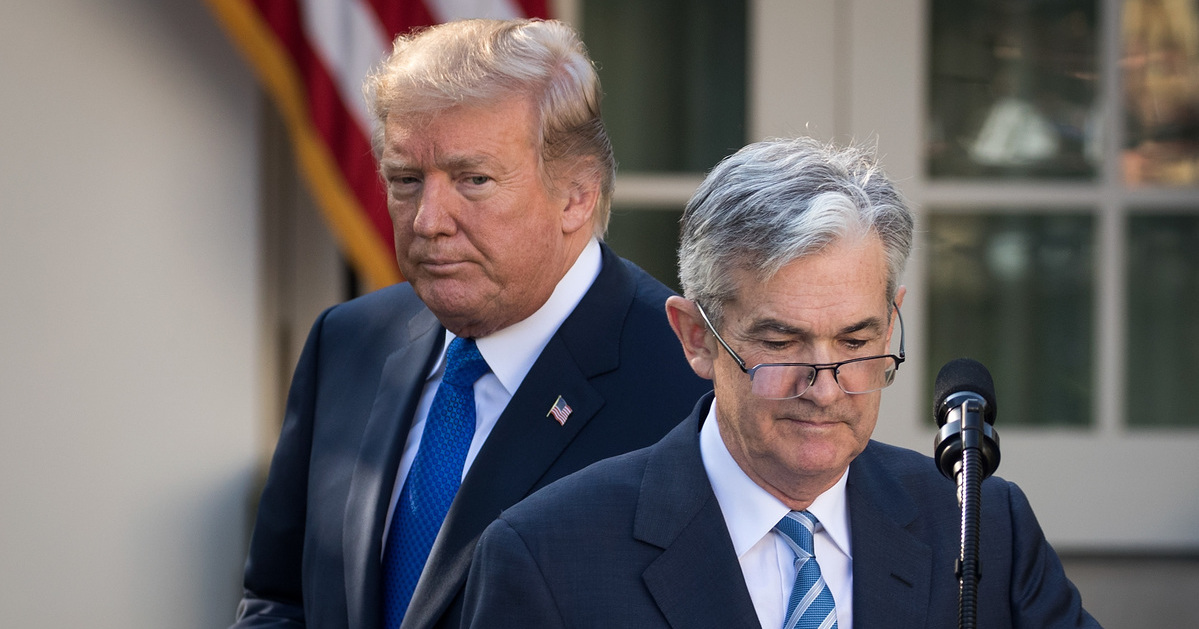
Can President Donald Trump fire Federal Reserve Chair Jerome Powell? Some experts say that such a move is well within the president’s authority.
Writing in Forbes in September, economic analyst Patrick W. Watson highlighted language germane to the issue of removing members from the Federal Reserve Board of Governors. This language comes by way of the Federal Reserve’s originating legislation, the Federal Reserve Act, which, according to the Federal Reserve itself, “sets out the purposes, structure, and functions of the [Federal Reserve] System as well as outlines aspects of its operations and accountability.”
Section 10(2) of the act reads, in relevant part:
Upon the expiration of the term of any appointive member of the Federal Reserve Board…the President shall fix the term of the successor…in such manner as to provide for the expiration of the term of not more than one member in any two-year period, and thereafter each member shall hold office for a term of fourteen years from the expiration of the term of his predecessor, unless sooner removed for cause by the President.
“That’s all it says on the subject, as far as I can tell,” Watson notes. “The Act doesn’t define what the word ’cause’ would entail. But Congress clearly thought the U.S. president should be able to remove board members before their terms expire, under certain conditions.”
What sort of conditions might qualify?
Open Markets Institute Fellow Matt Stoller offered some additional insight on Saturday morning.
“It’s [sic] probably be stupid/bad for Trump to [fire Powell], but the anguished screams about the norm fairy are worse,” Stoller tweeted in response to news that Trump was querying his advisers on whether he had the authority to fire the Federal Reserve chair. “Elected leaders should control government policy.”
“Trump has the authority to do this,” Stoller insisted. “Fed board members have been breaking a very simple law forever.”
Which law might that be? Stoller pointed to section 10(4) of the act:
No member of the Board of Governors of the Federal Reserve System shall be an officer or director of any bank, banking institution, trust company, or Federal Reserve bank or hold stock in any bank, banking institution, or trust company; and before entering upon his duties as a member of the Board of Governors of the Federal Reserve System he shall certify under oath that he has complied with this requirement, and such certification shall be filed with the secretary of the Board.
Accompanying this citation, Stoller also provided three lines of data from Powell’s Executive Branch Personnel Public Financial Disclosure Report. Those three lines show that Powell is heavily invested–to the tune of at least $800,000–in the stock market by way of three separate index and exchange-traded funds. To wit: (1) the T Rowe Price Equity Index 500; (2) the Blackrock S&P 500 Index; and (3) the SPDR S&P 500 ETF.
Cutting to the chase here: each of the above-mentioned funds is heavily invested in the banking sector.
The T Rowe fund has plenty of money invested in JPMorgan Chase & Co. Ditto the Blackrock fund–which is also invested in Bank of America. The SPDR fund is also invested in JPMorgan Chase–with fully 16 percent of its portfolio invested in the financial services industry.
Would those investments run afoul of the rules? Maybe–removing a Federal Reserve Chair has never been tried before.
Watson imagined what a removal scenario might look like.
“Trump doesn’t mind breaking precedent to achieve his goals,” he noted. “So if he wants to remove Jerome Powell, I think he will do it. No one can stop him. Would Congress object? Probably, but its members have yet to impose any meaningful constraints on Trump. All he has to do is dream up some ’cause’ and most will fall in line.”
Stoller also helpfully provided the upshot of all this:
I also think it would be funny if Trump took advantage of an old conflict of interest law saying Fed board members can’t own bank stocks (though they all do through index funds) to fire a guy he doesn’t like. Ethics!
— Matt Stoller (@matthewstoller) December 22, 2018
[image via Drew Angerer/Getty Images]
Have a tip we should know? [email protected]